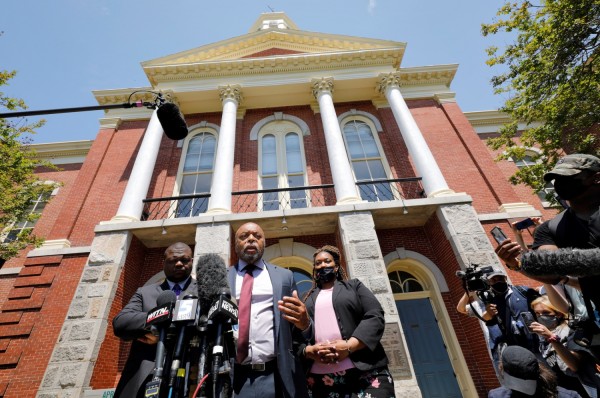A North Carolina judge on Wednesday rejected requests to release videos showing law enforcement's fatal shooting of Andrew Brown, Jr., during an attempted arrest, siding with arguments their immediate disclosure could jeopardize active investigations.
Pasquotank County Sheriff Tommy Wooten and roughly 20 media organizations had filed petitions to release body camera video from sheriff's deputies involved in the shooting death of Brown on April 21, arguing disclosure was in the public interest.
The shooting of Brown, a 42-year-old Black man, has led to a week of boisterous but peaceful demonstrations in Elizabeth City, a riverfront community near the Virginia border whose population of roughly 18,000 is half African-American.
Protesters, including a crowd of about 200 who marched through town on Wednesday ahead of a dusk-to-dawn curfew, have been clamoring for all the body camera videos to be shared with the public.
Superior Court Judge Jeff Foster said he was delaying the release sought by Wooten for 30 to 45 days "to allow completion of any investigation being undertaken" by the State Bureau of Investigation (SBI) and the local prosecutor.
Foster also ruled against the separate petition filed by media organizations, saying they did not have legal standing to call for the release of the videos under state law.
Ben Crump and other attorneys representing the Brown family said they were "deeply disappointed" by the ruling, noting that it was video footage that first raised public awareness about the killing of George Floyd, a Black man whose death in Minneapolis last May sparked global protests against racism and police violence.
Former police officer Derek Chauvin was convicted of murdering Floyd in a landmark trial, the verdict coming on April 20, the day before Brown was shot by sheriff's deputies trying to serve him with an arrest warrant.
Crump and his team have cited a private autopsy conclusion that Brown died from a gunshot wound to the back of his head in what they have characterized as the "execution" of a man who posed no threat.
'VIDEO EVIDENCE IS KEY'
"In this modern civil rights crisis where we see Black people killed by the police everywhere we look, video evidence is the key to discerning the truth and getting well-deserved justice for victims of senseless murders," the attorneys said in a statement.
Foster ordered the state to notify the court when its probe is completed and said he would reconsider Wooten's request to release the videos "based on the factors as they exist at that time." The FBI is investigating the shooting for possible civil rights violations.
Foster did rule, however, that four body camera videos of the incident could be disclosed within 10 days to Brown's son, Khalil Ferebee. He said the faces and other identifying features of the officers at the scene must be obscured.
It was not immediately clear how the videos would be shared with Ferebee and whether he could take possession of them.
District Attorney Andrew Womble had argued against immediate release during a hearing before Foster's ruling, saying it could have a negative impact on the SBI's investigation and prejudice the jury should there be a trial.
"What I do know is that you cannot swing a skunk in front of a group of people and then ask them not to smell it," he said.
Womble also disputed what he called the "patently false" description of the shooting by Brown family attorney Chantel Cherry-Lassiter, who said a short clip of body-camera footage she was allowed to view showed officers fired at Brown as he tried driving away from them.
With officers surrounding Brown's car during the attempted arrest, Womble said the video shows the vehicle backing up twice after a deputy tried to open the door and others shouted commands, before coming to a stop.
"The next movement of the car is forward, is in the direction of law enforcement, and makes contact with law enforcement," Womble said. "It is then and only then that you hear shots."
In a presentation of private autopsy findings to reporters on Tuesday, Brown family lawyers said he was initially struck in his right arm with four shots fired by deputies through his front windshield before he threw the vehicle into reverse, spun around and tried to drive away as a fifth and fatal gunshot struck him in the back of the head.
Wooten has said deputies were attempting to serve search and arrest warrants to Brown related to felony drug charges and that Brown had a history of resisting arrest.
The shooting has revived a push by civil liberties advocates and Democratic lawmakers in North Carolina for legislation requiring release of police bodycam and dashboard-cam video within 48 hours if someone requests it, unless investigators obtain a court order to restrict access.


